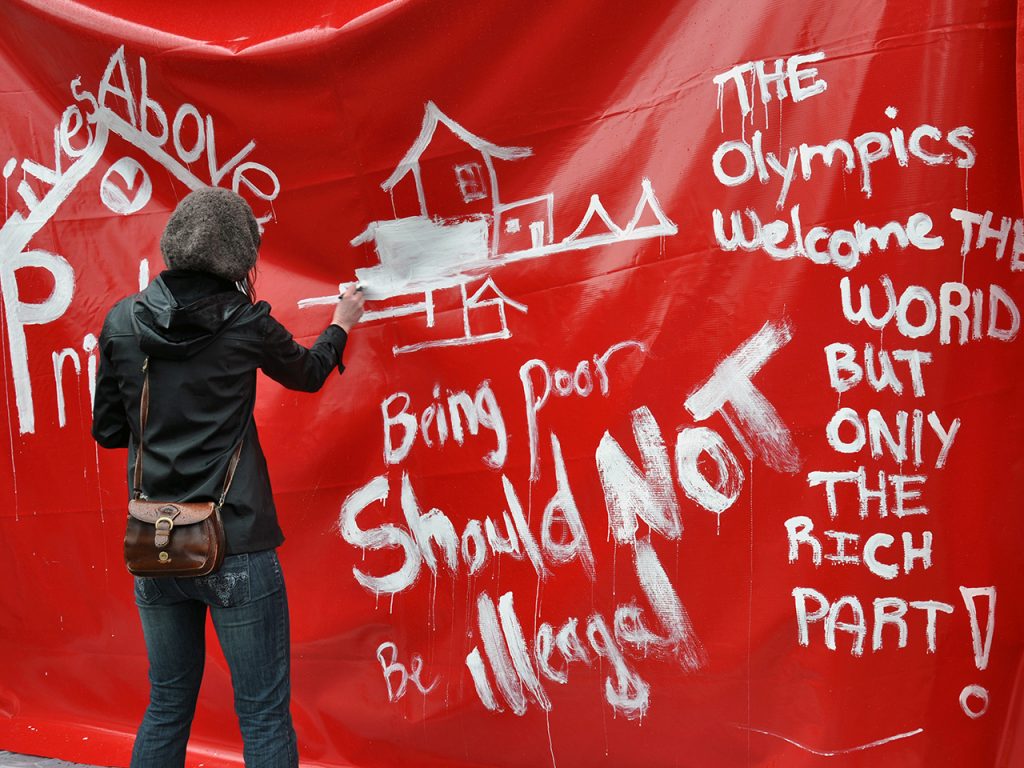Associate Professor of Spatial Design Studies Jilly Traganou won the Design Incubation Communication Design Educators Award in the category of Scholarship for her research in the graphic design histories of the Olympics. The material awarded came from her recent book Designing the Olympics: Representation, Participation, Contestation (Routledge, 2016)—specifically the chapters on graphic design, which deal with issues such as how the design program for the 1964 Tokyo Games helped shape Japan’s post-war identity, London 2012’s foray into making the public a part of the design process, and ways political groups appropriate official Olympic images as a form of dissent.
Accompanying the written work is a film, “Olympic Design” Mexico ’68: Visual Identity: Lance Wyman,” which Traganou produced with the help of students in the MA Design Studies program at Parsons School of Design as well as other New School programs. In the film, graphic designer Lance Wyman talks about his design work for the Mexico City ’68 Games. For her research, Traganou also interviewed Wolff Olins’ chairman Brian Boylan and anti-Olympic activists to fully gather the impact of graphic design that is produced before and during the Olympics.
The amount of graphic design research in relation to the Olympics is rather limited. Existing research has been mostly descriptive or celebratory, such as examining the design of the 1972 Munich Games by Otl Archer. In recent years, the celebratory tone has shifted to a more critical one. Traganou noticed this while guest-editing a volume for the Journal of Design History in 2012. Most scholars interested in the design of the Olympics come from backgrounds in urbanism and geography partly because it has now come into public consciousness that the Olympics have profound effects on host cities after the games. One of Traganou’s book chapters is dedicated to the examination of the role of design in counter-Olympic movements from the 1960s to the present.
Even though dissent plays a major part in her work, Traganou said that she doesn’t want to discount the work of designers chosen to work on the Olympics, which often leave an impact beyond the three-week time frame of the games. Designers’ aspirations are often different than those of Olympic organizers, as revealed in her study of the conflict between Wolff Olins’ designers and Olympic authorities during the 2012 Olympic Games. The work of official designers can also be critical of the Olympics and often tries to break the boundaries that the Olympic legal framework is imposing.
In Traganou’s words:
“For my own mental map, as someone coming from spatial studies, graphic design is a part of a continuum. Graphic images are primarily expressing the conception or the branding of an Olympic City. Sometimes they operate as smoke screens to distract the public from changes that happen behind the scenes or from developments that often have a questionable impact to the Olympic City’s community life. But at the same time, the graphic design program can fulfill other important functions such as to develop a visual language for public navigation in the urban realm, leaving an important legacy in the city. Thus even though I pay attention to the use of design in counter Olympic movements, I also pay attention to the aspirations of the designers who work on Olympic programs, even though these might be peripheral to the vision of those who plan the Olympics.”
The award follows Traganou’s Fulbright fellowship which allowed her to travel to Brazil over the summer and during the Rio 2016 Summer Games.
Jilly Traganou is core faculty in the MA Design Studies program at Parsons School of Design where she teaches a spatial studies course on the Olympics.
Tags: design incubation award, graphic design, highlights, jilly traganou, olympics
